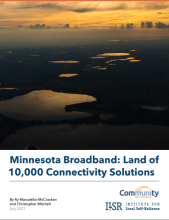Minnesota Broadband: Land of 10,000 Connectivity Solutions

In a new report, the Institute for Local Self-Reliance showcases the diverse range of approaches communities and local Internet Service Providers (ISPs) have taken to expand affordable, high-quality Internet access in Minnesota. It includes a series of case studies that detail how communities are meeting the connectivity challenges of a broken marketplace shaped by large monopoly service providers.
Download Minnesota Broadband: Land of 10,000 Connectivity Solutions [pdf] here.
The profiled projects include municipal networks, public-private partnerships, cooperatives, and private investment. They run from the most rural areas of the state to Minneapolis. Some examples include:
- RS Fiber Cooperative, in south central Minnesota, which has brought fiber to local businesses and town residents. Rural residents benefit from RS Air, a fast wireless service available at affordable prices.
- Arrowhead Electric Cooperative’s fiber network in Cook County, which succeeded beyond original projections. It provides fast and affordable Internet access to one of the most far-flung parts of the state.
- St. Louis Park’s partnerships with both ISPs and the builders of large condominium complexes. One of the providers working with St. Louis Park is better known as the fastest ISP in Minneapolis, USI Fiber.
- Christensen Communications, a 100+ year-old telephone company in south central Minnesota. The company demonstrated a strong commitment to its communities when the pandemic hit, and is now going above and beyond to build fiber with federal subsidies.
- The Fond du Lac Band, in northern Minnesota, which built a fiber-to-the-home network that is rare in Indian Country.
Ry Marcattilio-McCracken, co-author of the report and Senior Researcher with ILSR’s Community Broadband Networks initiative, said of the report’s findings:

